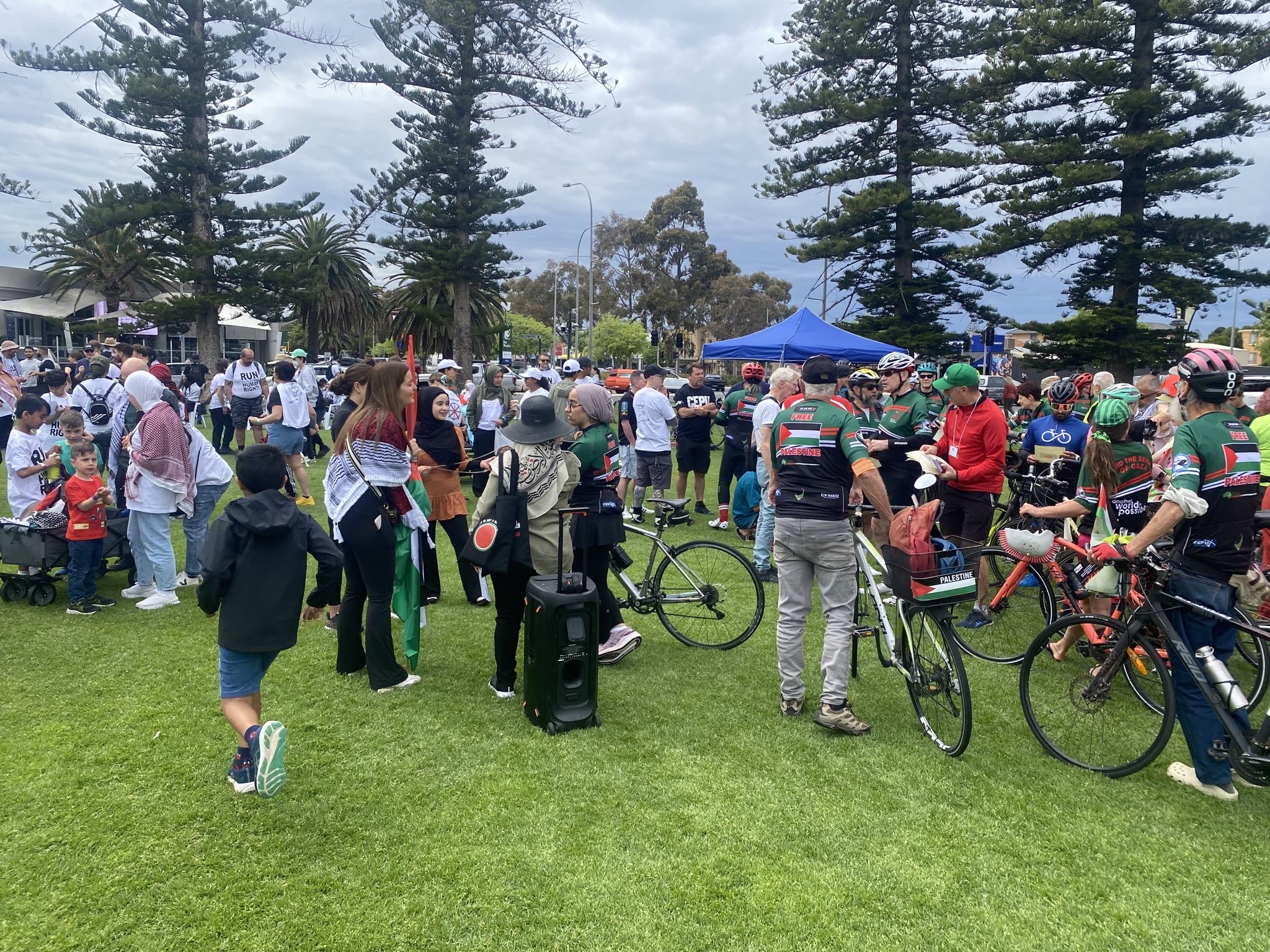I recently attended an Australian Friends of Palestine charity fundraiser. It was a run-walk on a warm Sunday afternoon at Glenelg. Merchandise was sold, donations taken, and those entering paid to help raise money and awareness about the genocide in Palestine. In the end, twenty thousand Australian dollars were raised. The event was friendly and well meaning, and in line with the organizer’s speech that “Today we put our anger aside,” there was no indignation present.
I spoke to a handful of people about Palestine. One lady responded, “Can we talk about something else, as it’s not appropriate to discuss with kids nearby.” I had mentioned IDF snipers intentionally shooting children—the kids present were out of earshot from my words. The subject came up because those in attendance had shirts that read, “I am a doctor, not a target.” Besides the speeches, and the trade union members expressing solidarity, there was no real talk among the many “white faces” about the genocide or Palestine. Those Palestinians in attendance seemed more sombre or too busy operating the food trucks serving attendees. The volunteers worked hard and seemed sincere and kind. I thought it was a nice event.
Performative activism is what YouTuber Kidology has termed the social media trend of influencers suddenly caring about human tragedy to profit or gain publicity, to make the tragedy about themselves, or to insert their own passions and beliefs into the mix. Examples include university students taking over faculty buildings with a less than distinct message or influencers lip syncing a speech from The Hunger Games while footage from Gaza plays as a prop behind them. These are emotional outbursts that exhibit their own narcissism rather than accomplishing any objective that may help others.
Linda Polman in her book War Games depicts the vulgar use of misery and suffering for profits by charity organizations. Outside of the more obvious material profiteering lurks a social currency that one gains in expressing concern for a crisis. Sincere individuals may feel better about themselves because they shared an online post they may not have read or RSVP’d an event they may not attend. “It’s cleansing,” as one person told me when I spoke to them about this.
When speaking with a casual or viral activist, there tends to be a lack of depth in understanding what they are passionate about. Usually they are interested in how a crisis makes them feel, relating it to themselves. The crisis is generally assumed to have started on one particular date, and defeating “villains” is simplified into being elected away so long as awareness or funds are raised. (Those same snipers shooting children will just as eagerly serve the next political party and will keep their job regardless.)
“Slacktivism” was the name given to the feel good activism in response to the Kony 2012 online campaign fostered by The Invisible Children, when one of their videos became a sensation. The term “slacktivist” was coined for people who would “like” or “share” something, reaching the extent of their action and concern. Online news outlets have become adept at writing headlines so that the sentence in the header is enough for social media spreadablity. No one has time to read a five hundred word article, but they can certainly share it based on the title.
Just as it’s done with the Russo-Ukrainian War, the pollution of domestic politics has conflated the perspective and nuances of the present war in the Middle East. In a general sense, pro-Israel supporters tend to be on the right of modern liberal democracies while pro-Palestine supporters are more to the left. The violence and history of conflict has been simplified to be digestible for people who lack the attention span to investigate. For example, a religious person will see the problem as a spiritual crisis; an atheist as a problem with religion; Marxists see class warfare; bigots in terms of race; anarchists as an example of mandatory hierarchies, and so on.
Today’s election in the United States is widely seen as a make or break situation for peace because of the insertion domestic nonsense. Other recent genocides did not take on as much interest online or among partisan groups; the misery of the Sudanese did not fit narrative perspectives and went almost unnoticed. It’s hard for Americans to make the Sudanese genocide about white supremacy or a crisis of gender. But Israeli influence has spread far and wide, and few nations have been as active in trying to curate an image for itself. At a local hiking trail that I frequent here in South Australia, there is a monument at its start point honoring an Australian-Israeli friendship pact.
Self-insertion into the misery occuring in Palestine can be rewarding, and online virtue signaling tends to pay off. It’s straightforward to raise money for “awareness,” when the point is “feel good” participation, rather than direct support in a crisis. But what if we’re not supposed to feel good about that sort of thing? Is this activism or ego-inflation? Among the many good activists sharing facts and original reporting to expose the truth to the wider world are those who do it because it pays to care (for now).
Social media has become a battle ground between people sharing what is occuring in the world and people who are only interested in the “current thing.” This division leads to disdain for the victims themselves. “Fuck the Palestinians,” I heard a ring-wing man say in response to a left-wing politician attaching themselves to the narrative. Contrary to the organizer’s speech, I don’t think we should put aside our anger. I also don’t think that we should hate or seek violence against anyone innocent. The greatest crimes of humanity have been committed when individuals lose their own identity and become collectives. To use a demographic slur for someone and then treat them accordingly in an assumption of supremacy is perverse.
I wish to relate an experience going back to the anti-war protests of 2003. Before social media, when so many were concerned about the upcoming U.S. invasion of Iraq, people were invested to find out where to attend. Millions turned up across the world, some because they were antiwar and others because they were just anti-George Bush.
In Adelaide there was a decent showing and I spoke with a lot of university students, one of which I subsequently kept in contact with. She was a student unionist, Frida Kahlo-type of socialist who was passionately vocal at the protests, screaming “Fascists!” at mounted police. Over a decade later, she used her university degree to get a job in the defense sector. When I spoke to her about Australian “defence” tech likely being used in Yemen to kill children—I included an article on fifty school children that were killed in a coalition strike—she replied, “It’s hard to find well paying jobs that are not linked to something immoral. I avoid the politics.”
I noticed that others who attended the 2003 protests lost interest in the days and weeks following the U.S. invasion. To them, the war didn’t exist in the years after. It no longer mattered. It was not an event for them to attend or an outlet to squeal at cops out of righteousness; it was no longer “cleansing.” Over the years they would take on a mortgages, have families, and build careers. They were too busy to care, or participate in activism that went beyond a hashtag or a solidarity walk in between school pick ups and wine tours.
So many times in the West a youthful commie will become the worst kind of Gordon Gecko capitalist. The genocide in Palestine has pulled up a new generation of these people. Eventually they will get corporate and government jobs and move on while their kids find another cause to feel good about. In the meantime, they kids over there get to die again and again and again. And no amount of awareness or runs or hashtags will change that unless we start changing ourselves, and the world we live in.

































